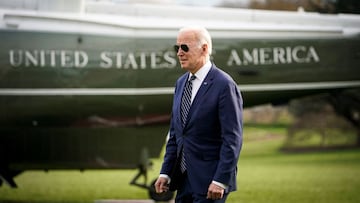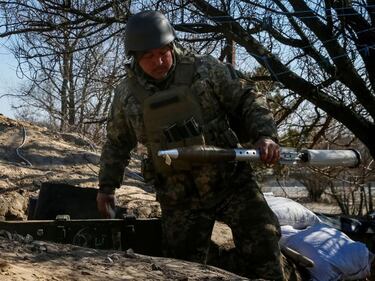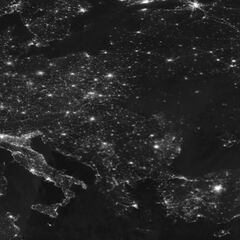What has Biden said about Putin's sanctions on the US?
Russia retaliated to US sanctions by placing Joe Biden and other top US officials on a no-travel list but the White House was not overly concerned.

Despite Vladimir Putin’s assertion that his war in Ukraine is going according to plan, several international intelligence services have reported that is far from the case on the ground, with Russia’s invasions forces bogged down in vicious fighting against an organized and motivated Ukrainian defense while also suffering from supply and logistical issues. The war, which is still officially described by the Kremlin as a special military operation – jail sentences await dissidents who dare to defy Putin’s government by using the term – is now almost a month old and Russia has made little progress in its simultaneous assault on various Ukrainian cities while the capital, Kyiv, is shaping up to be the invader’s Market Garden, putting up a fight that has taken Russian military top brass by surprise and could prove to be the end game for Putin’s designs.

More:
Putin's strategy hinges on Kyiv
If the Russians fail to take the city, Ukraine will have an even stronger hand in ongoing negotiations to bring an end to the conflict, but the concern for the western powers – who have so far proven willing to provide hardware and advisory support to the besieged Ukrainian forces but will continue to fall well short of military intervention unless directly provoked – is that Russia will escalate by threatening NATO territory. China has so far largely kept its counsel on the war, failing to rebuke Moscow for its military action while keeping the option of indirect support for the invasion on the table.
The United States, which this week announced $800 million in new military aid to Kyiv, is concerned Beijing is "considering directly assisting Russia with military equipment to use in Ukraine," Secretary of State Antony Blinken said, adding that President Joe Biden will make clear to China's President Xi Jinping that Beijing "will bear responsibility for any actions it takes to support Russia's aggression." Biden was due to speak to the Chinese leader on Friday to lay out America’s stance on any potential aid for Russia, opening a potential new front on the global economic battle being waged through sanctions.
Some of the roughly $40 billion in Russian foreign-currency debt now at risk of default is held by a group of ESG funds that are designed to invest in so-called sustainable assets https://t.co/UehfMjwh5Q
— Bloomberg (@business) March 15, 2022
Sanctions run Kremlin's coffers dry
In the context of Russia’s stalled offensive, the financial struggle between the Kremlin and the western powers takes on even greater significance. The Biden administration has imposed severe sanctions on Moscow, halting Russian energy imports and targeting Russian banks and technology as well as Putin and the Kremlin directly, among other measures, which will put additional strain on the Kremlin’s coffers. Analysts suggest the war is costing Russia around $20 billion per day and the country is close to defaulting on its foreign debt after around half of its foreign reserves – around $315 billion – were frozen.
While the western powers have pledged to fund Ukraine’s resistance Russia’s list of allies grows thinner by the day. Belarus, essentially a satellite state in the tradition of the former Soviet Union, can hardly foot the bill and Putin’s assertion that Russia can strengthen ties with China and other nations while weathering the storm of international sanctions depends largely on whether Beijing sees any benefit in overt support for the Kremlin. For every day that Ukraine successfully resists the invasion, Russia’s ability to maintain the war diminishes, which may force Putin in to a corner from which China feels disobliged to extricate its nominal ally.
The United States has issued unprecedented sanctions against Russia. The result has Russian currency in a freefall. The Russian stock market is closed. The credit rating of Russia has now been designated as "junk."
— Vice President Kamala Harris (@VP) March 16, 2022
Moscow retaliates with US travel ban
In response to western sanctions, Moscow has imposed retaliatory measures on Washington, including placing a travel ban on 13 top US officials including Biden, Defense Secretary Lloyd Austin, CIA chief William Burns, National Security Adviser Jake Sullivan and White House press secretary Jen Psaki. However, the move appeared largely symbolic, since Russia's Foreign Ministry said it was maintaining official relations and if necessary would make sure that high-level contacts with the listed individuals could take place.
Related stories
The White House shrugged off Moscow’s sanctions, suggesting a clerical error may have inadvertently sanctioned Biden’s deceased father by omitting the suffix "junior" from the spelling of the US president's name.
"President Biden is a junior so they may have sanctioned his dad, may he rest in peace" Psaki said. "None of us are planning tourist trips to Russia, none of us have bank accounts that we won't be able to access, so we will forge ahead," she added, while confirming that if the situation arises, the US officials on Russia’s blacklist “will have the ability” to hold direct and indirect talks with Russia.
